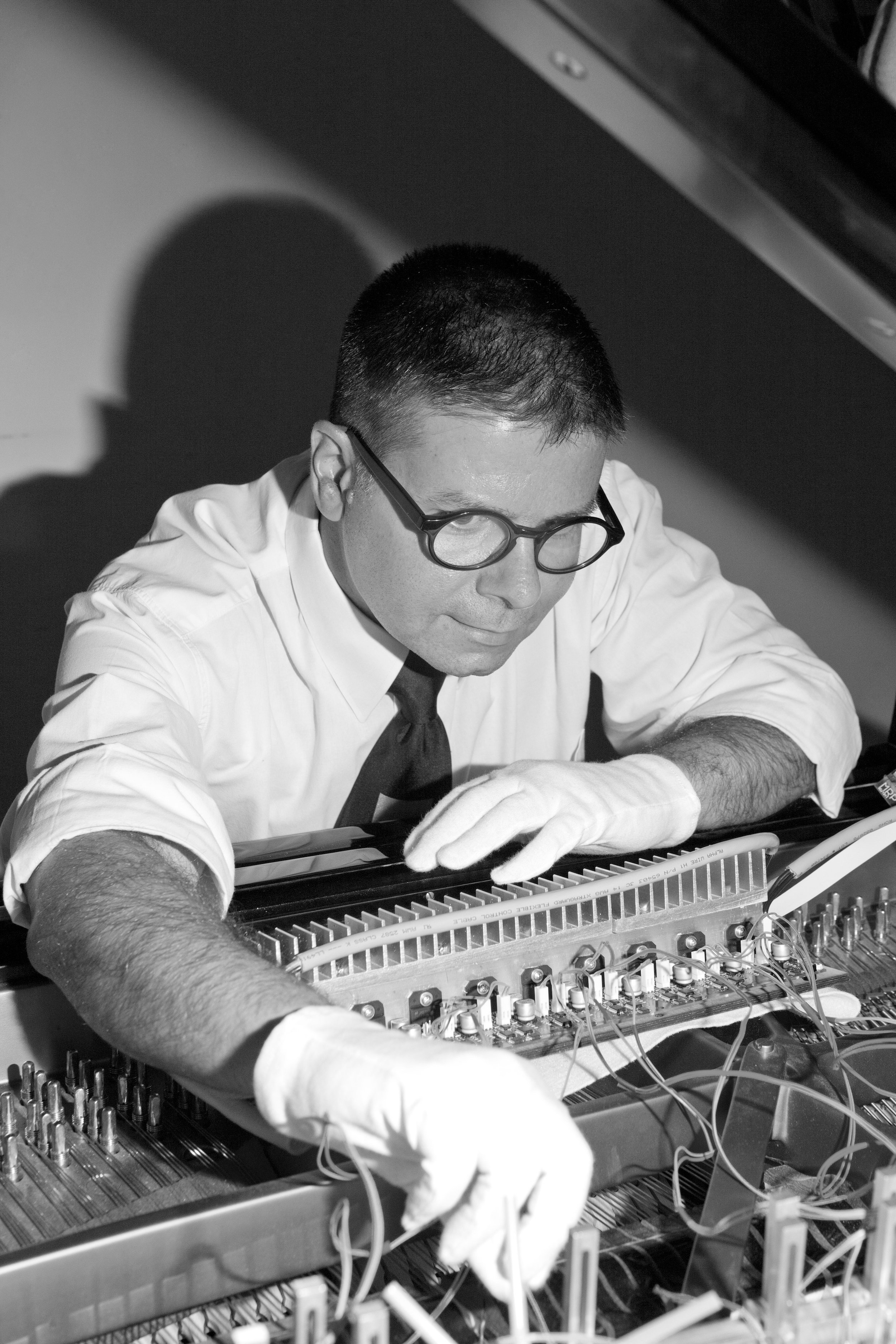
opus glitch_
A Performance-Research Experimental Lab
From exploring the potentials of implementing human-computer interactive systems in designing innovative concert formats to the realisation of multidisciplinary projects that involve machine learning and artificial intelligence, computational creativity, motion sensor technology, and live coding environments among other latest artistic-scientific developments, opus glitch_, a performance-research experimental lab developed by the Contemporary Chamber Orchestra Elbe, aims at creating innovative projects to engage a diverse audience of contemporary music enthusiasts, as well as those interested in the intersection of art and science.
Multiverse Symphony
By Eduardo R. Miranda
Quantum Computing, AI & Musical Creativity: A World Premiere on May 3rd, 2023, at the new ligeti center in Hamburg,
On May 3rd 2023, as part of the Ligeti-Festival at the Music and Theater University (HfMT), and the Inauguration of the new ligeti center in Hamburg, Miranda teamed up with the quantum technology and arts company, Moth, and the opus glitch_ performance-research lab, a project by the Contemporary Chamber Orchestra Elbe, to create Multiverse Symphony.
opus glitch_ A Performance-Research Experimental Lab:
Rafal Zalech, Violin // Katrin Szamatulski, Flute // Samuel Stoll, Horn // Jonathan Heilbron, Double Bass // Nora-Louise Müller, Clarinet // Ronan Whittern, Bassoon // Jakob Nierenz, Cello // Yalda Zamani, Conductor
Eduardo R. Miranda is a composer working at the crossroads of music, science, and new technologies. His background as an Artificial Intelligence (AI) scientist and a classically trained composer with early involvement in avant-garde pop informs his distinctive music. He has composed for BBC Radio 3, BBC Concert Orchestra, BBC Singers, and Scottish Chamber Orchestra. Currently, he is a professor in computer music at the University of Plymouth and an associate researcher at Quantinum, where he is pioneering new approaches to musical composition with quantum computers. His latest books, Handbook of Artificial intelligence for Music and Quantum Computer Music, are published by Springer Nature.
Multiverse Symphony was composed with quantum computers, and its performance involves live interaction with quantum hardware via the Internet and features Q1Synth, a novel quantum computer musical instrument.
In the 20th century, pioneering composers changed the face of music through electronic technologies, and experiments with chance and determinism. For example, as early as the 1930s, Edgar Varèse varied the speed of turntables to produce distortions and collages. But it was not until the 1950s that significant new kinds of music began to emerge. In 1951, John Cage used an Oriental oracle to create Music of Changes for piano: he consulted the I Ching to make compositional decisions. And around the same time, Pierre Boulez composed Structures for two pianos. Every aspect of this piece was decided by pre-determined rules, which Boulez followed strictly. György Ligeti’s Artikulation, which is entirely electroacoustic, is another notable piece of this era. Ligeti synthesised sounds electronically. Then, he cut the recording tape into pieces and devised a method to compose with them, which is partly aleatoric and partly rule-based. With the advent of digital computers, composing like Varèse, Cage, Boulez, and Ligeti became mainstream. Nowadays, most composers are versed in programming computers to manipulate recordings and simulate rules and randomness. But computing technology is ever-evolving. And so is music.
A quantum computer deals with information encoded as quantum bits, or qubits. The qubit is to a quantum computer what a bit is to a digital one: it is a basic unit of information. In hardware, qubits live in the subatomic world. They are subject to the laws of quantum mechanics. Miranda programmed quantum computers to generate musical materials with which he composed Multiverse Symphony. He leveraged quantum mechanical phenomena such as superposition, entanglement, and interference to create music in ways that would be unfeasible using a standard digital computer.
Eduardo R. Miranda
The Goat Song Project
The first version of a Collaborative Composition-Improvisation with the application of Digitaize smart Instruments, Live-Coding and Electronics was Commissioned by the musikprotokoll Festival, and Premiered at the Dom im Berg in Graz on the 9th of October 2022.
Nimikry (Alessandro Baticci, Rafał Zalech): Bass Flute, Violin, Digitaize Smart Instruments // Jorge Sánchez-Chiong: Turntables // Rojin Sharafi: Modular Synthesizer // John Eckhardt: E. Bass // Shiva Feshareki: Ambisonics Turntables // Yalda Zamani: Concept, Coordination, Live-Coding // Siavash Talebi: Video Production // ORF Radio Österreich 1: Audio Production
TEASER - Goat Song Project
Full Performance - Goat Song Project
The Creative AI Symposium 2022
Our progress as humans in understanding how we make sense of our world goes hand in hand with understanding how to create intelligence from scratch, and how to develop artificial creativity as an essential manifestation of it.
We have a long way to go to achieve artificial general intelligence, but our path towards our current achievements in AI would not have been possible without the contribution of, and inspiration from computer science, neuroscience, mathematics, cognitive science, and linguistics.
Today, we hardly can ignore the significance and effectiveness of interdisciplinary research and collaboration. Why should the Arts, which has been with us humans long before we learned to speak, to collect, and to transfer knowledge, be left out of the equation of this progress when it is the ultimate manifestation of what we are trying to understand?
"What I cannot create, I do not understand” was written on Richard Feynman's blackboard at the time of his death in 1988, so in the pursuit of understanding creativity, we might as well create. alongside artists.
The Creative AI Symposium is an exchange platform for those interested in technology and culture who might not otherwise meet in this constellation. In a co-curation alongside ARIC (Artificial Intelligence Center in Hamburg), in June 2022 we will explore the full range of uses of AI in music, art and writing and have invited top-class speakers.




